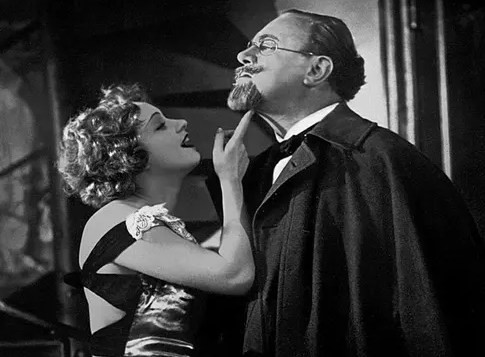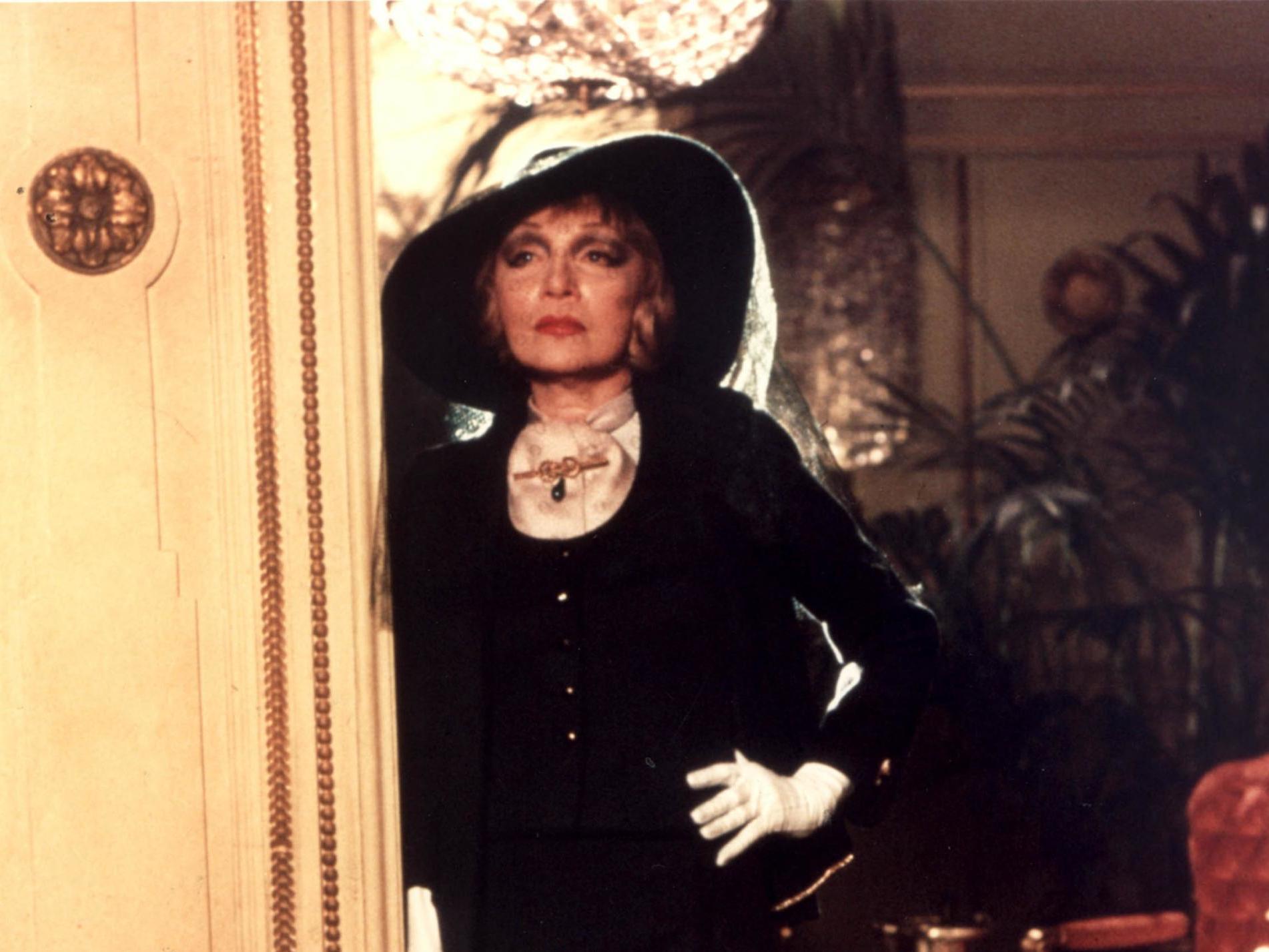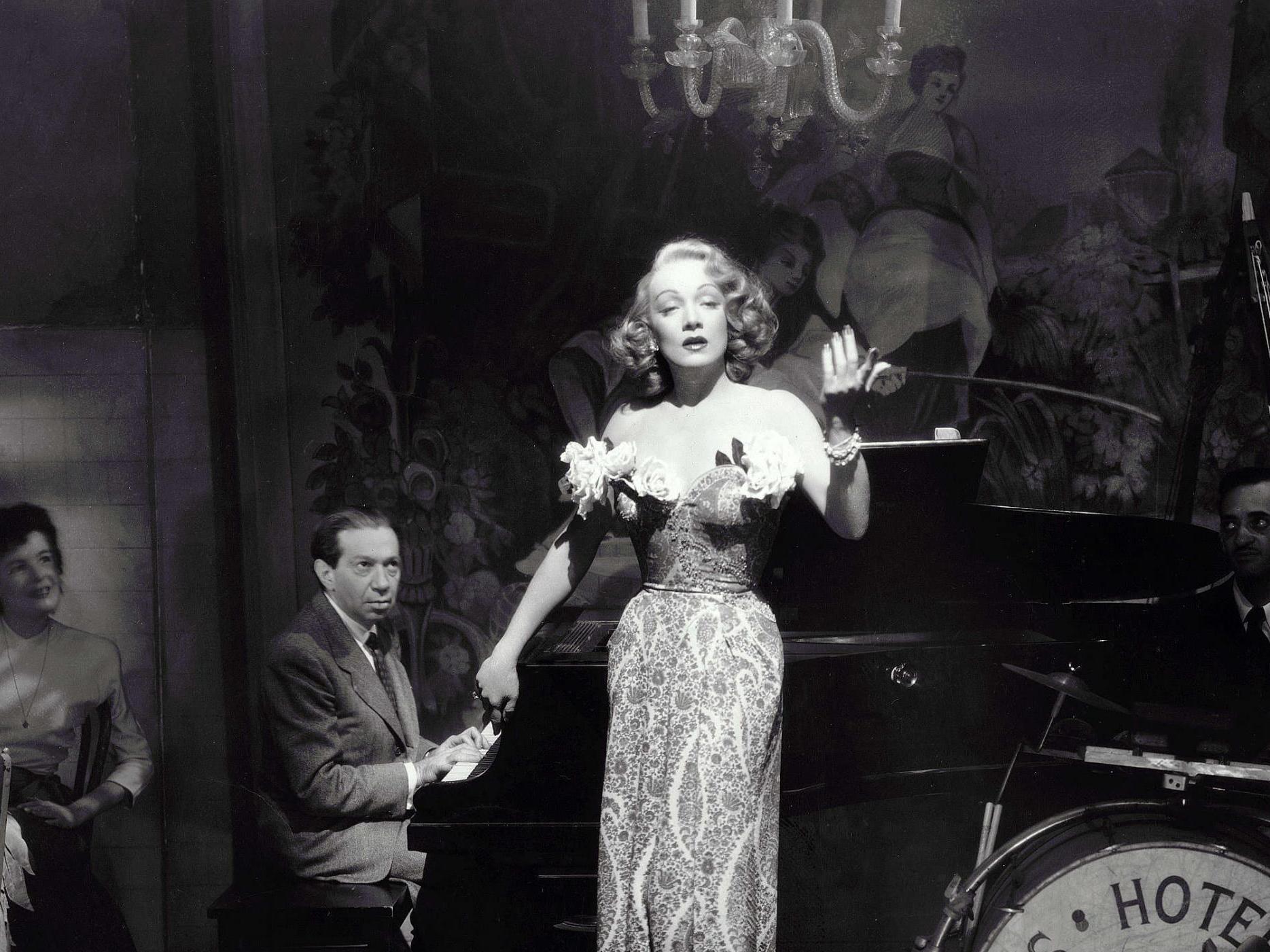‘Her masculinity appeals to women and her sexuality to men’: The continuing fascination of Marlene Dietrich
It’s 90 years since the release of ‘The Blue Angel’, the film that made Dietrich an international star. But her reputation still endures while those of many of her contemporaries have long since faded, says Geoffrey Macnab

Speaking in the early 1980s, Marlene Dietrich (1901-1992) calculated that there had been 55 books written about her and claimed she hadn’t read any of them. “I don’t give a damn about myself,” the legendary German star told her interviewer, fellow actor Maximilian Schell, who made a very curious documentary about her, Marlene (1984).
Of course, if Dietrich really had been as unconcerned about herself as she pretended, she would never have tallied up the number of biographies that she had inspired. She cared far more about her public image than she was letting on, one reason why her reputation still endures while those of many of her contemporaries have long since faded. This year marks the 90th anniversary of Josef von Sternberg’s The Blue Angel (1930), the film which marked her emergence as one of the most potent sex symbols or her own or any other era.
In their seven films together between 1930 and 1935, von Sternberg was the Svengali who transformed a run-of-the-mill actor and singer into a screen goddess. At least, that is how he liked to see it. Before he took Dietrich’s career in hand, he claimed in his autobiography, “she had been photographed to look like a female impersonator. There are many unflattering photographs of her pre-Blue Angel period in existence, portraying an inhibited subject almost anxious to hide.”
Von Sternberg cast Dietrich in strong and sultry roles, as nightclub singers, spies, courtesans or empresses. Each part allowed him to dress her extravagantly, in furs, wigs and outrageous hats. He shot her in provocative close-ups, in which she seems to be taunting and teasing the audience. In a period when other Hollywood female stars played tragic heroines or naive, all-American ingenues, she was an independent, androgynous and exotic figure, always unembarrassed by her own desires. Her shamelessness was her selling point.
In The Blue Angel, Dietrich plays the cabaret artist, Lola Lola, first seen in stockings and suspenders performing at the Blue Angel. She sings a song full of double entendres (“I have a pianola that is my joy and pride … but I don’t let any man lay a paw on my keys”). The bumbling professor (Emil Jannings), a symbol of stolid bourgeois conservatism, becomes obsessed with her. Ninety years on, it is still uncomfortable to witness his sexual humiliation. He is the authority figure but makes an utter buffoon of himself. While he is buttoned up and repressed, Dietrich’s Lola is utterly uninhibited. She plays with him like a cat with a mouse.
“I gave her nothing she did not already have,” von Sternberg conceded that Dietrich’s ability played some part in her rapid transformation into an international star. “What I did was to dramatise her attributes and make them visible for all to see.”
If he was good for her, Dietrich was just as important for him. The main reason von Sternberg is remembered today is because of his films with her like The Blue Angel, Morocco (1930), Shanghai Express (1932), Blonde Venus (1932) and The Devil is a Woman (1935).
British critic Kenneth Tynan summed it up nicely when he wrote that Dietrich “has sex but no particular gender. She has the bearing of a man: the characters she plays love power and wear trousers. Her masculinity appeals to women and her sexuality to men.”
The German was at once glamorous and down to earth. She may have appeared aloof on screen but that was not how she appeared on set. Crews adored working with her. When technicians fell ill, she would make them chicken or mushroom soup.
Thanks to her collaboration with von Sternberg, Dietrich had become an expert in lighting and cinematography.
“She [Dietrich] knew how to position her face to look good,” director Billy Wilder said of her. She would startle him by suddenly remarking: “I don’t think the key light is in the proper position.” Wilder had never before encountered an actor who knew what the key light was, let alone where it should be placed.
Dietrich’s grasp of the technical side of filmmaking meant she looked as alluring as ever when she appeared opposite David Bowie, Kim Novak and Curd Jurgens in her final film, Just a Gigolo (1978), set in the decadent Berlin of the 1920s. She may have been in her late 70s but she knew precisely how to use light, make-up and costume to best advantage. “I am the head of a regiment of sorts … the gigolos,” her character, Baroness von Semering, tells her potential recruit, Paul Ambrosius von Przygodski (Bowie). Her features are as strong as ever. She has those heavy, mysterious, world-weary eyes and is wearing red lipstick.
Joshua Sinclair, the young American writer and producer who persuaded her to appear in the film, remembers her as a kindly figure. “I spent a lot of time with her. I was in her house. She cooked dinner for me. I fixed her telephone. She was like my grandmother at the time. She was wonderful,” he tells The Independent. “She did not take herself seriously. That was her charm.”
Once the cameras began to roll, though, Dietrich was as professional as ever. She “took control of the set … even though she was no longer a young lady, she was very, very aware of the lighting in the room, of the camera and of how she looked. She was very much in control.”

Karl Lagerfeld had designed her costume. Dietrich’s make-up was done by Bowie’s make up artist, Antony Clavet. “He took her aside and made her look 40. It was magnificent,” Sinclair recalls.
Dietrich was never to appear on screen again.
“She is still sexy … I wish I had slept with her. Yeah, she’s gorgeous. She had a very masculine thing about her, but I think she maintained a sexual allure,” Madonna told Carrie Fisher in an interview done for Rolling Stone magazine in 1991, the year before Dietrich’s death. By then, Dietrich had been living out of sight in Paris for many years. Her obsession with managing her own image had reached its natural conclusion. She now wouldn’t let anybody see her. Sinclair suggests she was very conscious that writers and filmmakers who approached her late in her life were often trying to exploit her.
When Schell interviewed Dietrich for his documentary, she refused to appear on screen.
“I’ve been photographed enough,” she told him. “I’ve been photographed to death.”
Dietrich was making the film for financial reasons. She spoke off camera and her responses were eccentric and cantankerous. Nonetheless, the film was revealing. Schell rejected the conventional chronological structure of biographical documentary and tried to provoke his subject into honesty and spontaneity. She sometimes sounds very curmudgeonly. “I can’t stand women’s lib,” she pronounces at one stage, seemingly oblivious to her own role as a feminist pop cultural icon. Nonetheless, she is bracingly honest and often funny.
Next month sees the re-release of Billy Wilder’s A Foreign Affair (1948), which ranks with Dietrich’s most personal films. She plays Erika Von Schlütow, a notorious Nazi entertainer trying to stay afloat in post-war Berlin. The city is devastated after years of allied bombing. The once proud Berliners are reduced to eating “scraps out of garbage pails”. American soldiers think nothing of exploiting their misery, trading chocolate and alcohol for sexual favours.
“We’ve all become animals with exactly one instinct left, self-preservation,” Erika tells the prissy American congresswoman Phoebe Frost (Jean Arthur), who has come to Berlin to investigate the daily lives of the US occupying forces.
“What do you think it was like to be a woman in this town when the Russians first swept in. I kept going. It was living hell,” she continues.
This isn’t one of Dietrich’s most celebrated roles but it exemplifies everything that made her such an enduring star. An ardent anti-Nazi campaigner in real life, she was playing a woman who had consorted with Hitler and Goebbels. Now Erika has to hustle to survive. Wilder shows her early on in the tiny rundown apartment that she can only afford thanks to her US army officer lover, Captain Pringle (John Lund). He brings her presents (nylons, a mattress) and saves her from the military police who want to cart her off to labour camp.

Erika is in a wretched situation but, in typical Dietrich fashion, she makes the best of it. The bedraggled figure in her dressing gown, first seen brushing her teeth, is transformed when she goes on stage in a glittering gown at an underground nightclub. Dietrich was in her late forties when she played the role but she still has the patter, the songs and the seductiveness she had shown when playing Lola for von Sternberg almost 20 years before.
Like Erika, Dietrich was a survivor who always adjusted to changing circumstances. She wasn’t one of those stars who reinvents herself as a character actress in later life. With Dietrich, the glamour never diminished. Even when she was playing a small supporting role, for example as the brothel keeper on the Mexican border in her friend Orson Welles’ thriller Touch of Evil (1958), she retained that familiar poise and allure. She was still the cynosure.
The film is celebrated for its elaborate and ingenious opening crane shot, which lasts for over three minutes, but Dietrich makes just as big an impression. She has the film’s most famous line, just after the corrupt, obese but strangely sympathetic cop Hank Quinlan (Welles) has been killed. “He was some kind of a man. What does it matter what you say about people,” she murmurs before turning around and walking away into the night. With a lesser actor, the scene would have seemed trite. With Dietrich, it’s a moment of searing pathos.
The biographies of Dietrich are still being published. There are now many more than the 55 she mentioned to Schell. New details continue to emerge about her many lovers, an eclectic list of 20th century notables, male and female, allegedly including George Bernard Shaw, John F Kennedy, Edith Piaf, John Wayne and Frank Sinatra. However, 90 years after The Blue Angel, she remains as enigmatic as ever. The line from Touch of Evil applies to her too. “She was some kind of woman. What does it matter what you say about people.”
A Foreign Affair is released by Eureka on Blu-ray in the UK, as part of The Masters of Cinema Series on 22 June 2020. ‘The Blue Angel’ is available on BFI Player. ‘Just a Gigolo’ is due to be re-released later this year
Join our commenting forum
Join thought-provoking conversations, follow other Independent readers and see their replies
Comments